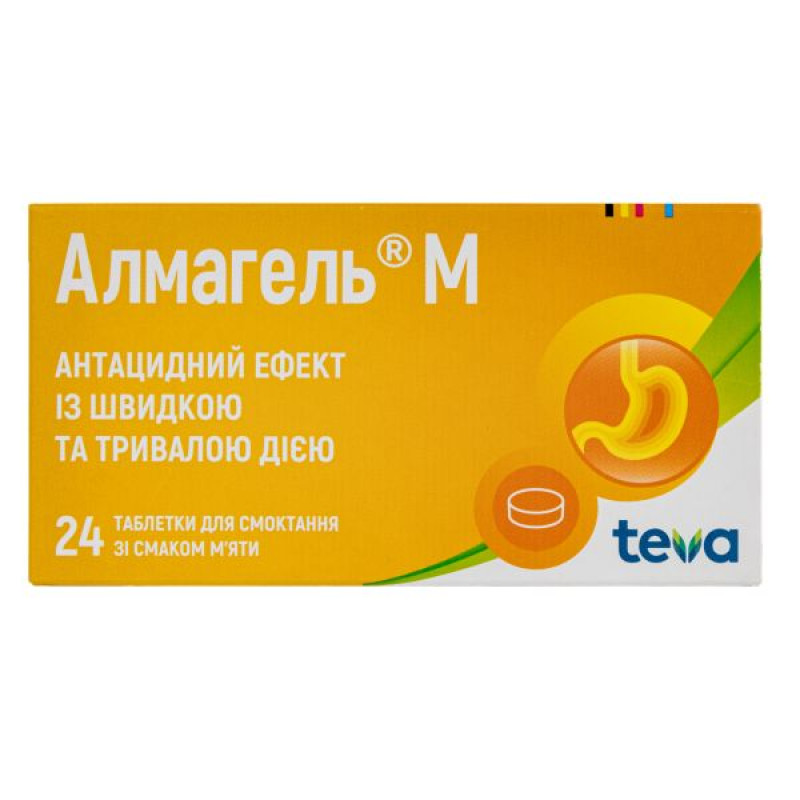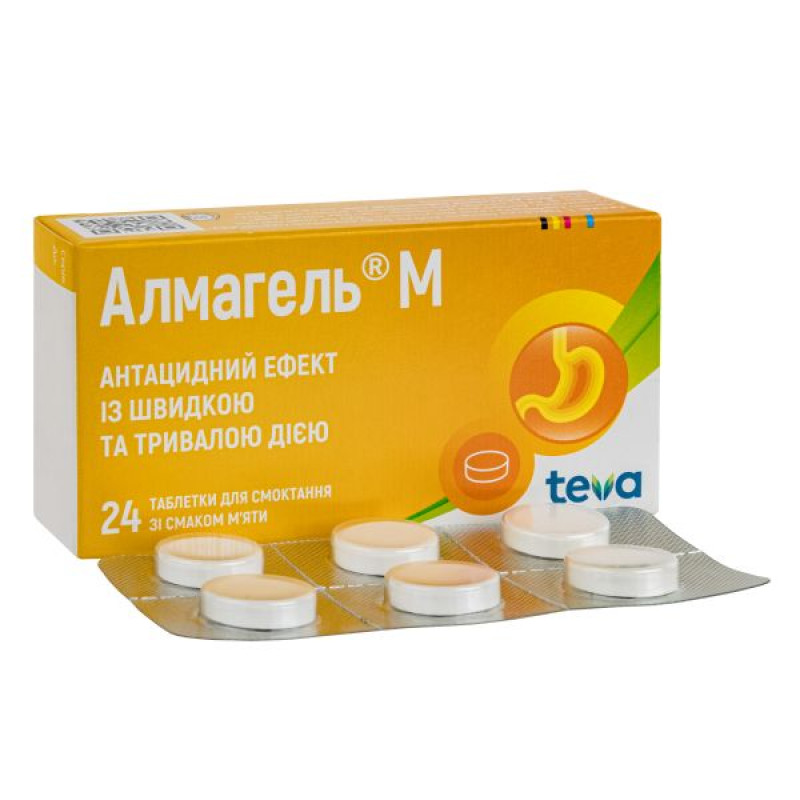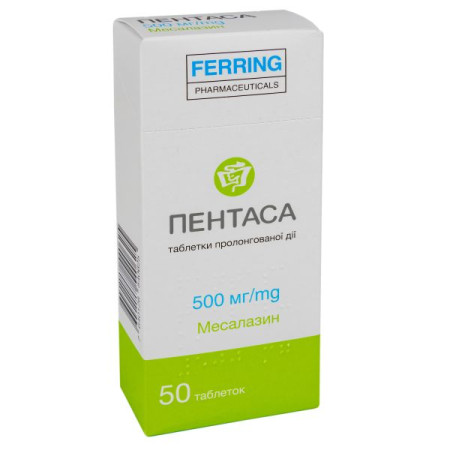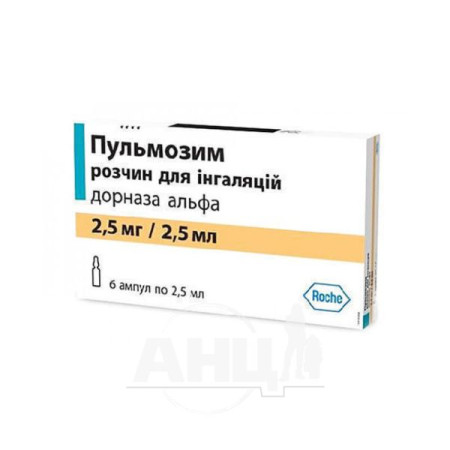Almagel M lozenges mint No. 24
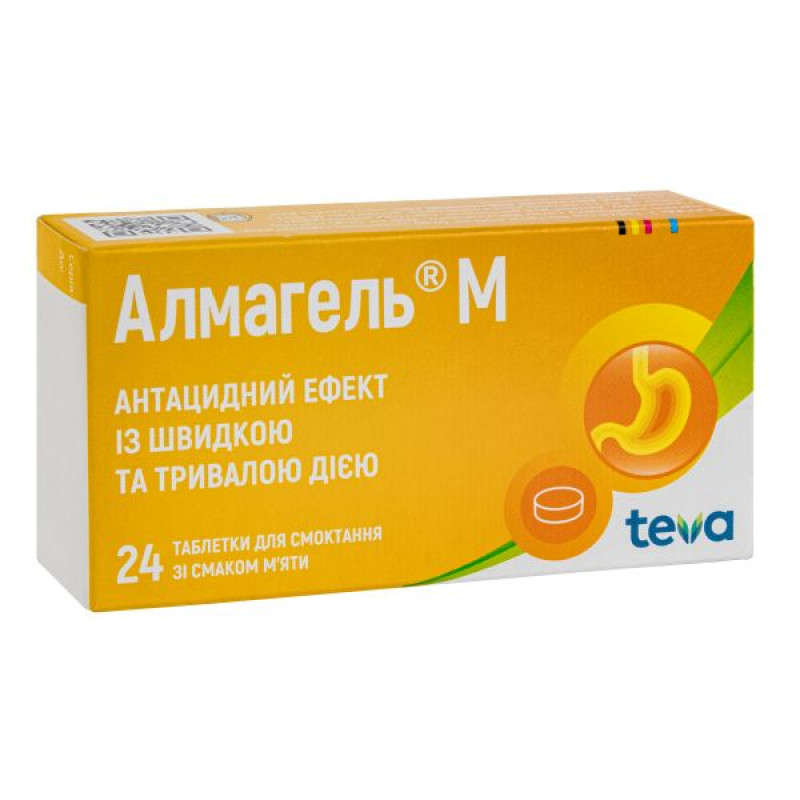
Instructions for Almagel M lozenges mint No. 24
Composition
active ingredients: 1 tablet contains 450 mg of aluminum hydroxide-magnesium carbonate gel dried, 300 mg of magnesium hydroxide;
Excipients: lactose monohydrate, mannitol (E 421), pregelatinized starch, colloidal anhydrous silicon dioxide, croscarmellose sodium, mint flavor, aspartame (E 951), magnesium stearate.
Dosage form
Lozenges.
Main physicochemical properties: white or almost white, round flat tablets with a smooth surface and beveled edges.
Pharmacotherapeutic group
Preparations for the treatment of acid-dependent diseases. Antacids. Combined preparations and complex compounds of aluminum, calcium and magnesium. ATX code A02A D01.
Pharmacological properties
Almagel® M is a buffered antacid that reduces the acidity of gastric juice and eliminates unpleasant sensations caused by increased acidity (pain, heartburn). The optimal antacid effect of Almagel® M consists in neutralizing hydrochloric acid in the stomach, in a fast and long-lasting effect (within 2 hours) and is provided by the appropriate composition of the drug and the ratio of its two active components.
1 tablet of Almagel® M neutralizes 21.5 mmol of hydrochloric acid.
Aluminum hydroxide in magnesium carbonate gel is a buffer antacid substance that reduces the increased acidity of gastric juice to physiological levels (pH 3–5) and thus ensures a normal digestive process. Aluminum hydroxide adsorbs and precipitates pepsin in gastric juice and thus reversibly inactivates it.
Magnesium hydroxide is a non-buffered antacid that is not absorbed. It has a pronounced rapid neutralizing effect and also has a laxative effect.
The combination of aluminum hydroxide and magnesium hydroxide provides enhanced antacid effect and reduces the risk of undesirable effects characteristic of the components when used separately (for example, diarrhea after the use of magnesium compounds or constipation after the use of aluminum compounds).
The antacid effect begins immediately after taking Almagel® M tablets and lasts for approximately 2 hours. Almagel® M inhibits the activity of pepsin, lysolecithin and bile acids, which also cause gastric disorders.
It has been proven that antacids containing aluminum hydroxide, in addition to their antacid effect, also enhance protective and regenerative processes in the gastric mucosa.
The cytoprotective effect, enhanced by aluminum ions, includes: strengthening of the gastric mucosa and release of sodium bicarbonate, activation of PGE2 and NO systems, accumulation of epidermal growth factor at the site of damage, and increase in the concentration of intragastric phospholipids. The mechanism of action is not fully understood.
Aluminum hydroxide, after reacting with hydrochloric acid of gastric juice in an alkaline environment, reacts with phosphates and carbonates. It is excreted in the feces in the form of insoluble salts.
After a chemical reaction, magnesium hydroxide is excreted from the body with feces also in the form of insoluble salts.
In patients with normal renal function, Almagel® M does not have a systemic effect, since only a small amount of the drug is absorbed from the digestive tract and is rapidly excreted in the urine.
Indication
Symptomatic therapy of digestive tract diseases accompanied by increased acidity of gastric juice, with or without heartburn, such as: peptic ulcer, gastritis, reflux esophagitis or hiatal hernia.
Contraindication
Hypersensitivity to magnesium and aluminum salts or to other components of the drug. Severe renal failure (acute and chronic), Alzheimer's disease, hypophosphatemia, habitual constipation, chronic diarrhea, severe abdominal pain of unspecified origin.
Interaction with other medicinal products and other types of interactions
Almagel® M, like other antacids, interacts with some other orally administered drugs. On the one hand, it enhances the effect of levodopa and nalidixic acid. On the other hand, it reduces the effect of drugs taken simultaneously (there is a decrease in the amount of absorption from the gastrointestinal tract). As a precautionary measure, a break should be taken between taking antacids and other drugs.
Should be taken 2 hours before or 2 hours after the drug (4 hours for fluoroquinolone and chloroquine): acetylsalicylic acid, H2-histamine receptor blockers, anti-tuberculosis drugs (ethambutol, isoniazid for oral use), rifampicin, tetracycline antibiotics, atenolol, metoprolol, propranolol, chloroquine, cyclines, rosuvastatin, diflunisal, cardiac glycosides (e.g. digoxin), diphosphonates, vitamins, fexofenadine, iron (salts), fluoroquinolones (e.g. ciprofloxacin, ofloxacin), sodium fluoride, glucocorticoid drugs (interaction with prednisolone and dexamethasone has been described), indomethacin, naproxen, kayexalate, ketoconazole, lansoprazole, lincosamides, phenothiazine neuroleptics (e.g. chlorpromazine), penicillamine, phosphorus (supplements), thyroxine.
When used simultaneously with salicylates, the excretion of salicylates by the kidneys is increased due to alkalization of the urine.
Quinidine excretion may be impaired with manifestations of quinidine toxicity, especially in patients with renal insufficiency.
Concomitant use with cholinergic agents reduces their effectiveness.
Concomitant use of aluminum hydroxide and citrates may lead to increased aluminum levels, especially in patients with renal insufficiency.
The use of the drug together with enteric-coated drugs may lead to more rapid dissolution of the coating and irritation of the stomach and duodenum.
The drug may reduce the absorption of folic acid.
When used in combination with levothyroxine, its hormonal action may be reduced. Pirenzepine enhances and prolongs the effect of Almagel® M.
Application features
Aluminum hydroxide may cause constipation, and magnesium hydroxide may cause intestinal hypokinesia. Use of this product in high doses may cause or aggravate intestinal obstruction and ileus, especially in patients at increased risk of such complications, such as patients with renal insufficiency or the elderly.
Do not use the drug for more than 6 consecutive days without a doctor's recommendation. If there is a need for frequent use of the drug, you should consult a doctor.
Long-term use of antacids may mask symptoms of more serious conditions, such as gastrointestinal cancer. Patients should consult a doctor if they experience weight loss, difficulty swallowing, or persistent abdominal discomfort; new indigestion; changes in existing indigestion; or kidney failure.
Aluminum salts are generally poorly absorbed from the gastrointestinal tract, and therefore systemic effects in patients with normal renal function are rare. However, the use of excessive doses of the drug or prolonged use of the drug, or even the use of normal doses of the drug in patients whose diet is characterized by a low phosphorus content, or in patients with alcohol dependence, can cause a phosphate deficiency in the body, which is accompanied by increased bone resorption and the occurrence of hypercalciuria with an increased risk of osteomalacia (due to the binding of aluminum to phosphate).
In patients with renal insufficiency, elevated plasma concentrations of both aluminum and magnesium are observed. In such patients, prolonged use of high doses of aluminum and magnesium salts may lead to the development of encephalopathy, dementia, microcytic anemia, or worsen the course of dialysis-induced osteomalacia. Patients with impaired renal function should avoid prolonged use of high doses of the drug.
Aluminum hydroxide may be dangerous for patients with porphyria who are receiving hemodialysis.
If symptoms persist for more than 10 days during treatment or the patient's condition worsens, the etiology of the disease should be checked and the treatment method reviewed.
In patients with low body weight, cachexia, and in children, the dose and duration of treatment should be determined with caution; lower doses of the drug and shorter treatment periods should be used.
In young children, hypermagnesemia may occur when using magnesium hydroxide, especially if kidney function is impaired or the body is dehydrated.
Almagel® M should always be taken 1 hour after a meal, as in this case the duration of its action is significantly increased.
Almagel® M contains lactose, therefore patients with congenital problems of galactose intolerance, lactase deficiency or glucose-galactose malabsorption should not take this drug.
This medicine contains aspartame, which is a derivative of phenylalanine, which is dangerous for patients with phenylketonuria.
Use during pregnancy or breastfeeding
There are no reliable data on teratogenic effects in animals. Currently, there is no evidence of the development of congenital defects and fetotoxic effects in clinical practice. On the other hand, the possibility of further monitoring of pregnancies during which exposure to the drug occurred is too limited to exclude the possibility of risk. It is necessary to take into account the content of aluminum and magnesium ions, which can affect the passage in the gastrointestinal tract:
During pregnancy, the drug can be taken only as prescribed by a doctor if the expected benefit to the mother outweighs the potential risk to the fetus/child.
Breastfeeding should be discontinued during treatment with the drug.
Ability to influence reaction speed when driving vehicles or other mechanisms
Does not affect.
Method of administration and doses
Adults and children over 12 years of age: 1-2 tablets 4-6 times a day, approximately 1 hour after meals, and also in the evening before bedtime (no more than 8 tablets per day).
The duration of treatment is no more than 6 days, unless otherwise prescribed by the doctor.
For heartburn, it is used in the same dosage regardless of mealtime.
Do not use the drug for more than 6 consecutive days without the advice of a doctor.
If there is a need for frequent use of the drug, you should consult a doctor.
Almagel® M tablets should be sucked slowly and in no case swallowed whole.
Caution should be exercised in patients with mild to moderate renal impairment, and prolonged use and high doses should be avoided. Use is contraindicated in patients with severe renal impairment.
Elderly patients
Caution should be exercised when using in elderly patients.
Children
Almagel® M is not recommended for use in children under 12 years of age. In children, lower doses of the drug and shorter treatment periods are recommended.
Overdose
No cases of acute overdose have been recorded.
High doses may cause nausea, vomiting, decreased appetite, diarrhea, constipation, onset or exacerbation of mechanical and dynamic intestinal obstruction in patients at risk (see section "Special instructions"). With prolonged use of high doses, hypophosphatemia, hypocalcemia, hypercalciuria, muscle weakness, decreased tendon reflexes, increased fatigue, cardiac arrhythmias, osteomalacia, osteoporosis, hypermagnesemia, hyperaluminemia, encephalopathy, nephrocalcinosis may occur.
Symptoms of overdose also include facial flushing, exhaustion, muscle weakness, and inappropriate behavior.
Signs of metabolic alkalosis may also be observed: changes in mood or mental activity, numbness or pain in the muscles, nervousness and increased fatigue, slowed breathing, unpleasant taste sensations.
Long-term use of Almagel® M can cause hypermagnesemia, despite the fact that the drug is almost not absorbed from the digestive tract.
If an overdose of the drug is suspected or if clinical signs appear, it is necessary to cancel the drug and take measures to quickly remove the drug from the gastrointestinal tract (administer activated charcoal, perform gastric lavage and other procedures to reduce the absorption of aluminum and magnesium ions).
Possible symptoms of overdose are treated symptomatically. Aluminum and magnesium are excreted in the urine; treatment of acute overdose consists of rehydration and forced diuresis. Intravenous calcium gluconate may be administered. In case of overdose in patients with impaired renal function, hemodialysis or peritoneal dialysis may be required.
Adverse reactions
Skin and subcutaneous tissue disorders: hypersensitivity reactions (urticaria, dermatitis, pruritus, angioedema and anaphylactic reactions).
On the part of the digestive tract: nausea, vomiting, diarrhea, constipation, change in stool color, abdominal pain.
Metabolism and nutrition disorders: hypermagnesemia (observed after prolonged use of magnesium hydroxide in patients with impaired renal function).
When using recommended doses, these side effects occur very rarely.
A decrease in the phosphorus content in the body is possible with prolonged use of the drug or when it is used in high doses, or even when using normal doses of the drug in patients whose diet is characterized by a low phosphorus content, increased bone resorption processes, hypophosphatemia, hypercalciuria, osteomalacia, since this drug contains aluminum; hyperaluminemia, hypermagnesemia. In patients with renal failure, increased plasma concentrations of both aluminum and magnesium are observed. In such patients, prolonged use of high doses of aluminum and magnesium salts can lead to the development of encephalopathy, dementia, microcytic anemia or worsen the course of dialysis-induced osteomalacia. Aluminum hydroxide can be dangerous for patients with porphyria receiving hemodialysis.
Expiration date
3 years.
Storage conditions
Store at a temperature not exceeding 25 °C out of the reach of children.
Packaging
6 tablets in a blister; 4 or 8 blisters in a box.
Vacation category
Without a prescription.
Producer
PLIVA Hrvatska d.o.o.
Location of the manufacturer and address of its place of business
Prilaz baruna Filipovića 25, 10000 Zagreb, Croatia.
There are no reviews for this product.
There are no reviews for this product, be the first to leave your review.
No questions about this product, be the first and ask your question.







